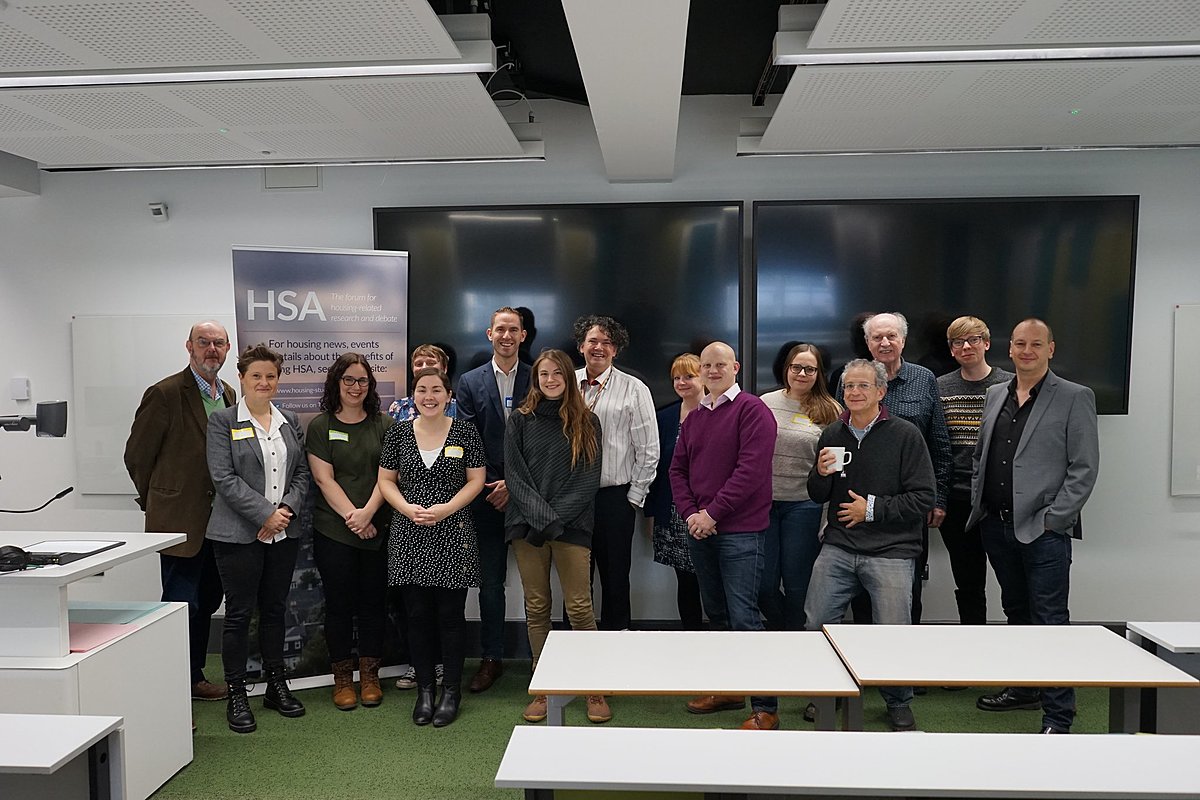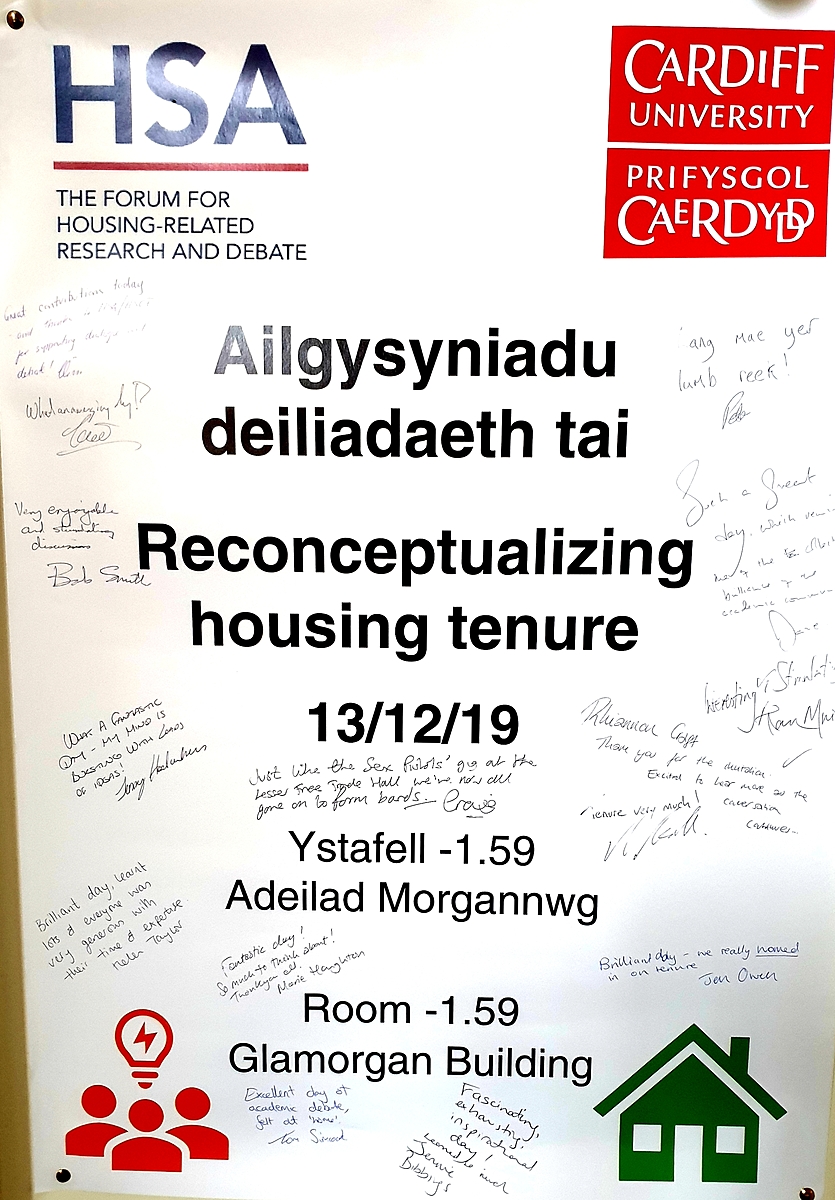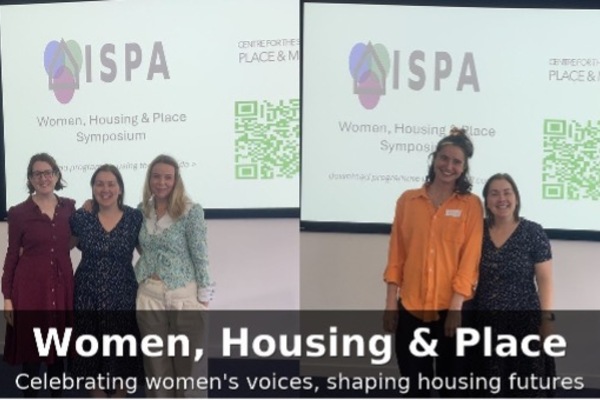In December 2019, Craig Gurney (University of Glasgow), Jenny Hoolachan (Cardiff University) and Kim McKee (University of Stirling) hosted the first HSA/HSCT seminar on the subject of tenure. Here, they provide an overview of the day and the plans for a follow-up seminar in 2020

Introduction
In March 2019, Alan Murie wrote a paper for the HSA website entitled Building on what we know: the fault lines for housing research. The paper called for a renewed focus and discussion around the way in which housing tenure is used as a building block for housing research. At the same time, the HSA and the Housing Studies Charitable Trust invited applications to organise a seminar series on the theme reconceptualising housing tenure to develop and debate Murie’s call for action. Craig Gurney (now University of Glasgow, previously Cardiff University), Jenny Hoolachan (Cardiff University) and Kim McKee (University of Stirling) collaborated on the successful bid to organise two events in Cardiff and Stirling. The Cardiff event took place on December 13th 2019, and the Stirling event is scheduled for later in 2020.
Aims of the series
The aim of the seminar series is to promote a thoughtful and critical “outside of the box” conversation between housing academics and practitioners about the ways in which our understandings and use of housing tenure might be reconceptualised.
Alan Murie’s (2019) paper on the fault lines for housing research is a timely reminder of the importance of periodically critically re-assessing the building blocks of housing research. He is not the first housing scholar to make an observation about the conceptual limitations of housing tenure, however. As long ago as 1978, Kemeny observed that the relationship between housing tenure and the social structure was “virtually invisible and taken for granted” (p 53); in the 1980s warnings of the dangers of “tenure fetishism” (Gray 1982, p 267), reification and the conceptual chaos of the “tenurists’” arguments (Barlow and Duncan 1988, qv Saunders 1986) were clear. These ideas were subsequently developed elsewhere (see, for instance Somerville and Knowles 1991, Ruonavaara 1993). Despite more recent empirical and conceptual work on “Generation Rent” and housing aspirations (Hoolachan et al 2017, McKee et al. 2019, Preece at al. 2019), Murie’s paper alerts us to a sense of unease that housing researchers’ ability to conceptualise housing tenure has failed to keep pace with ongoing changes to housing markets and housing systems. If it is the case that the 1980s-1990s marked a golden era in conceptual research around housing tenure, then perhaps we are currently experiencing a darker age.
The seminar series aims to illuminate the concept of housing tenure through critical reflection and to ask challenging questions about its future status as a meaningful and useful concept within housing research.
Rethinking core concepts
Ruonavaara’s paper on the problems of comparison and translation in housing tenure makes a useful conceptual distinction between essentialist and constructivist approaches. The seminar series uses this distinction as a starting point for a conversation about the experience of tenure and the framing of tenure thus. In Seminar 1, “Experiencing Tenure” the focus was on ideas around precarity, security and home. Building on the outputs from seminar 1, the second seminar is provisionally entitled “Framing Tenure”.
Big Questions
There are a number of big questions which the seminar series addresses. For example;
- How do we respond to the challenge of Murie’s provocative “Fault-Lines of housing research”?
- Are housing tenures the best building blocks for housing research?
- What alternative concepts are on offer?
- How does the housing imagination constrain or enable us to reconceptualise tenure?
- How does the resurgence of interest in home and “security” help or hinder our thinking?
- Can housing classes be re-imagined in the light of the “Bourdieussian Turn” in social stratification research?
- Can we start to rethink production/consumption; regulation/control; rights/obligations and market/state in relation to housing tenures?
- Have we witnessed the death of a variable? - do tenures predict anything anymore?
Feedback from seminar 1
The first seminar took place on 13th December in Cardiff and was kept deliberately small in order to facilitate participation and discussion amongst experts in the room. A competition was held to enable Early Career researchers to contribute, with Tom Simcock (Edge Hill) and Marie Houghton (Birkbeck) being awarded travel support. The full delegate list for the first event was as follows:

Jennie Bibbings (Shelter Cymru), David Cowan (University of Bristol), Rhiannon Craft (Cardiff University), Craig Gurney (University of Glasgow) Jenny Hoolachan (Cardiff University), Marie Houghton (Birkbeck, University of London), Yoric Irving-Clarke (Chartered Institute of Housing), Pete MacKie (Cardiff University), Kim McKee (University of Stirling), Alan Murie (University of Birmingham), Jennifer Owen (Cardiff University), Richard Ronald (University of Amsterdam), Tom Simcock (Edge Hill University), Bob Smith (CaCHE/Cardiff University), Helen Taylor (Cardiff Metropolitan University).
The seminar was organised into four paired presentations with a lengthy discussion led by a chair after each pair. One of the contributors – Yoric Irving-Clarke – has written a separate blog post which details the specifics of each presentation. The hashtag #rethinkingtenure was used to report and comment on the seminar via Twitter and we would encourage readers to follow and contribute themselves.
Below, we conclude with some reflections on the day and our plans for the next event.
Reflection and next steps
Despite the pre-Christmas fatigue that had befallen most of our attendees, the energy and enthusiasm for discussion throughout the day was palpable and this was testament to the high quality of the presentations and passion for unpacking the complex topic of tenure. The small number of contributors and lengthy time for discussions enabled a range of in-depth, theoretical ideas to be debated. Given the competing activities that characterise most people’s work lives, this opportunity felt like a rarity that everyone welcomed. Although we cannot offer a neatly packaged answer to the question of how we rethink tenure, it was clear from the discussions on the day that themes of home, materialities, socio-legal contexts, health, harms, asset-based welfare, new technologies and politics are important. More specifically, we are able to make the following observations which should be borne in mind when undertaking research on housing tenure and responding to the policy challenges ahead.
- Bring more nuance to the use of tenure when conducting research.
- Challenge extant research with new tenure variables.
- The PRS is the most dynamic sector in the UK but is still under-theorised and poorly understood. We need to look beyond the UK to fully understand how households are being challenged and reconfigured by new ways of living and new ‘tenures’.
- Greater recognition of the synergies between health and housing.
- Draw on a much wider set of theoretical influences when thinking about tenure.
- Domestic materialities cut across tenure and more attention is needed in this area.
- The material turn and mobilities turn offer alternative ways of rethinking tenure.
- In addition to asking ‘what does home mean?’ we should be asking ‘how much home do you need?’
- Better government-led statistical data regarding tenure is needed to inform policy change.
- Legality should not be forgotten: legal differentiation and regulatory differentiation should be more frequently foregrounded in the discussion, particularly in the context of devolved policy making.
- Recognise that one’s relationship with the state depends upon one’s housing tenure.
We have now started planning for our second seminar which will take place later in 2020 at the University of Stirling as we wish to take these themes forward to consider their implications for future research, policy and practice.
References
Barlow, J. and Duncan, S. (1988). The use and abuse of housing tenure. Housing Studies, 3(4), pp.219-231.
Gray, F. (1982). Owner-occupation and social relations. In S. Merret with F. Gray Owner occupation in Britain. London, Routledge and Kegan Paul. pp.267-291.
Hoolachan, J., McKee, K., Moore, T. and Soaita, A.M., (2017) ‘Generation rent’ and the ability to ‘settle down’: economic and geographical variation in young people’s housing transitions. Journal of Youth Studies, 20(1), pp.63-78.
Kemeny, J. (1978). Forms of tenure and social structure: A comparison of owning and renting in Australia and Sweden. The British Journal of Sociology, 29(1), pp.41-56.
McKee, K., Soaita, A. and Hoolachan, J., 2019. 'Generation Rent' and the Emotions of Private Renting: self-worth, status and insecurity amongst low-income renters. Housing Studies. https://doi.org/10.1080/02673037.2019.1676400
Murie, A. (2019). Building on what we know: Fault Lines for Housing Research [blog] Housing Studies Association website. 19th March 2019. Available at: https://housing-studies-association.org/2019/03/long-read-building-on-what-we-know-fault-lines-for-housing-research/ (Accessed on 08/11/19).
Preece, J., Crawford, J., McKee, K., Flint, J. and Robinson, D., (2019). Understanding changing housing aspirations: a review of the evidence. Housing Studies. https://doi.org/10.1080/02673037.2019.1584665
Ruonavaara, H. (1993). Types and forms of housing tenure: Towards solving the comparison/translation problem. Scandinavian Housing and Planning Research, 10(1), pp.3-20.
Saunders, P. (1986) Comment on Dunleavy and Preteceille. Environment and Planning D: Society and Space, 4(2), pp.155-163.
Somerville, P. and Knowles, A. (1991) The difference that tenure makes. Housing Studies, 6(2), pp.112-130.







